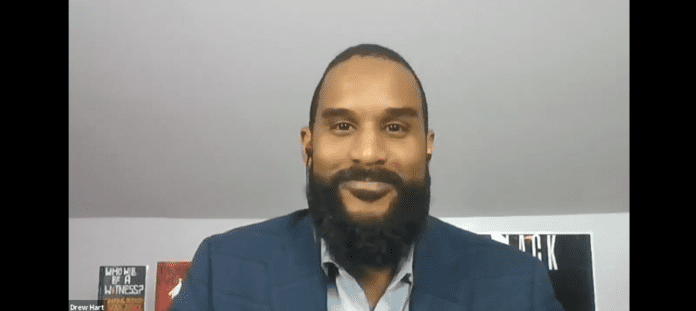Belmont’s Welcome Home Diversity Team and the Office of Multi-Cultural Learning and Engagement hosted Dr. Drew I.G. Hart for a virtual conversation about seeking God’s justice in America as a part of Belmont’s Debate 2020 Programming and annual Diversity Week. Hart is a pastor and professor of theology, a national leader in antiracism education and author whose latest book “Who Will Be a Witness?: Igniting Activism for God’s Justice, Love, and Deliverance” was released earlier this month.
Hart began with a story of a man who questioned “Why can’t we just get over it?” in regards to the racial injustices rampant in our communities. Hart took the question as a moment to lean in as a learning opportunity, but posed what he felt was the real question, “How can we get on it for the first time?” Hart asked who will be a witness and seek God’s justice, and answered this question by encouraging the need to look back to Scripture before looking forward for what it means to be a faithful witness.
Hart shared a brief history of the Christian faith, noting how Christians emerged as a minority population but over many centuries moved from the margins to the center, and from the center to power. Hart explained how he is baffled by the church’s entanglements with injustices. It seems that Christians neglect the things God cares about like justice, mercy and faithfulness, have domesticated Jesus and have too often lost sight of what it means to be the church. It seems to be in contrast to the way Jesus lived that is evident in Scripture. Preaching God’s kingdom, prioritizing the least of society and ministering to the poor and socially excluded are all central to who Jesus is.
“I believe that we have to take up the way of Jesus. Stop watering down what it means to be followers of Jesus,” Hart said. Hart desires to see God embodied in the church. In the face of injustice, he said this may look like the church nonviolently resisting when evil shows up, doing the grassroots work for justice in solidarity with their neighbors in suffering or voting with consideration of those who are suffering.
Hart encouraged college students of faith to embody the life of Christ and to immerse oneself slowly into the life of Jesus, placing Jesus at the center of their faith and understanding. He offered practical ways for students to do this by starting in Scripture and engaging in dialogue with those who have experiences with Jesus from the underside. He emphasized the importance of listening to the stories of those who have encountered a liberating and co-suffering Jesus.
“Each of us needs to make sure if we don’t see that conversation happening, then we be the one to bring that conversation,” Hart said, encouraging everyone that they have a way to be an active participant in the conversation for justice and as a witness of faith.



